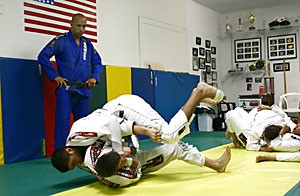10 students from the UA and Pima Community College are traveling to Los Angeles to compete in the World Championship of Brazilian Jiu-Jitsu with the hope of returning to Tucson as world champions.
Leading the students is Demetrius
Ramos, a pre-physiology senior and black belt master in Brazilian Jiu-Jitsu, who is also a competitor in the event.
This year marks a special opportunity for students competing in the World Championship, because for the first time in 10 years, the event will be held in the U.S.
From Aug. 22-Aug. 26, nearly 4,500 competitors from every nation will be fighting in L.A to establish this year’s champions.
“”It’s the opportunity of a lifetime,”” said Ryan Beauregard, a 25-year-old national champion and student of Ramos, of the competition’s move to the states.
The fighting style of Brazilian Jiu-Jitsu is a rapidly growing branch of Japanese Jujutsu, although Brazilian Jiu-Jitsu and is more dangerous and focuses more on grappling, throws, submissions and ground fighting. It is so dangerous that the risk of injury, disfiguration, disability and death is high.
“”I like the adrenaline rush,”” Ramos said of the sport and its possibility for injury.
To stay as safe as possible, the students have stuck close to Ramos, who began training at 15 under a man who has obtained a the highest possible level of black belt.
“”Demetrius is always in your corner,”” Beauregard said. “”He is a great role model. He is like a brother.””
Having obtained a black belt himself and touting six students who have won national championship titles under his leadership, Ramos is considered qualified to help lead the students to victory.
Chris Martinet, a political science senior and a student under Ramos, said he feels confident to have his teacher at his side.
“”He is like that older brother who wants to teach me what he knows,”” Martinet said. “”Not many coaches or trainers are like that, he’s rare.””
In competition, matches can last for up to 10 minutes, although in most cases one of the fighters will submit and lose.
It takes lots of practice to reach the level of stamina and endurance needed to last 10 minutes in a Brazilian Jiu-Jitsu match, but the students have had plenty of practice.
Ramos himself teaches two separate Jiu-Jitsu classes, one at his own academy, the Tucson Brazilian Jiu-Jitsu Academy, 710 E. Ninth St. and one that runs every Tuesday evening from 5-7 p.m. at the Student Recreation Center.
“”The class gives exercise and martial arts to some students,”” Ramos said. “”(It) teaches students, especially girls, some self-defense.””
Additionally, the classes have helped to form a bond among the competitors.
“”Once you go 100 percent with another person, they know you better than most ever will,”” Martinet said.
The mutual dedication for the sport has helped to create a support network, Beauregard said.
“”We sweat, we bleed and we get hurt together every day,”” he said. “”We are a family; everyone is united.””
For Ramos, it all comes down to the final moments of a tournament.
“”Seeing my students on the podium with a medal gives me joy,”” Ramos said. “”To see them with that confidence is amazing.””









